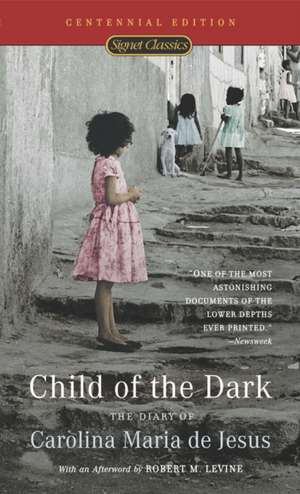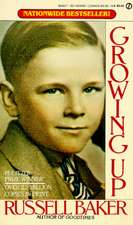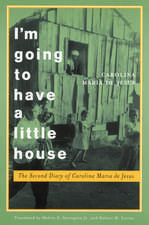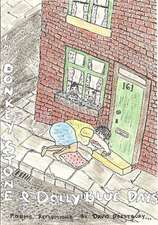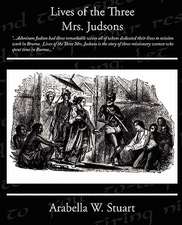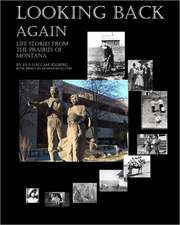Child of the Dark: The Diary of Carolina Maria de Jesus (50th Anniversary Edition)
Autor Carolina Maria Jesus, Carolina Maria de Jesus Traducere de David St Clairen Limba Engleză Paperback – 30 sep 2003 – vârsta de la 18 ani
The powerful firsthand account of life in the streets of São Paulo that drew international attention to the plight of the poor.
Includes eight pages of photographs and an afterword by Robert M. Levine
Translated from the Portuguese by David S. Clair
Includes eight pages of photographs and an afterword by Robert M. Levine
Translated from the Portuguese by David S. Clair
Preț: 42.85 lei
Nou
Puncte Express: 64
Preț estimativ în valută:
8.20€ • 8.58$ • 6.78£
8.20€ • 8.58$ • 6.78£
Carte disponibilă
Livrare economică 17-31 martie
Preluare comenzi: 021 569.72.76
Specificații
ISBN-13: 9780451529107
ISBN-10: 0451529103
Pagini: 208
Dimensiuni: 107 x 173 x 18 mm
Greutate: 0.11 kg
Ediția:50
Editura: Signet Book
ISBN-10: 0451529103
Pagini: 208
Dimensiuni: 107 x 173 x 18 mm
Greutate: 0.11 kg
Ediția:50
Editura: Signet Book
Recenzii
“Written between 1955 and 1960, Child of the Dark is the daily journal of an artist, a writer who, as the single mother of three young children, supports her family by picking through garbage for paper and scraps to sell. They live in a cardboard and wood-scrap shack in a Brazilian slum called the favelas, where there is no plumbing, and one public cold-water spigot is the only clean water source for several hundred people. Her journal documents the lives favelados are forced to live....Carolina de Jesus is a poet of intense dignity.”—500 Great Books by Women
“A haunting chronicle…a dramatic document of the dispossessed that both shocks and moves the reader.”—New York Herald Tribune
“It is a minor classic—because it is one of the very few books that have ever been written about the lowest and the poorest, les misérables, by one of themselves.”—Horizon
“It is both an ugly book and a touchingly beautiful book. It carries protest and it carries compassion. There is even bitter humor. As a fast-paced and strangely observant account of sheer misery, Child of the Dark is an immensely disturbing study of what can happen to a segment of the population of one of the world’s potentially wealthiest nations…a rarely matched essay on the meaning and feeling of hunger, degradation, and want.”—The New York Times Book Review
“A haunting chronicle…a dramatic document of the dispossessed that both shocks and moves the reader.”—New York Herald Tribune
“It is a minor classic—because it is one of the very few books that have ever been written about the lowest and the poorest, les misérables, by one of themselves.”—Horizon
“It is both an ugly book and a touchingly beautiful book. It carries protest and it carries compassion. There is even bitter humor. As a fast-paced and strangely observant account of sheer misery, Child of the Dark is an immensely disturbing study of what can happen to a segment of the population of one of the world’s potentially wealthiest nations…a rarely matched essay on the meaning and feeling of hunger, degradation, and want.”—The New York Times Book Review
Notă biografică
Carolina Maria de Jesus, a Brazilian woman with only two years of schooling, was the mother of three illegitimate children, each born of a different father. This story of her life in São Paulo stands as a vivid, incendiary social document. With stark simplicity, Carolina describes her squalid neighborhood, the favela, and tells how she lived hand to mouth. To keep herself and her children barely alive, to stave off their ever-present hunger, Carolina must scavenge for scraps of metal and paper in the gutter to sell. Her story is a witness to the vicious fights, the knifings, and the sordid sex of the favelados—prisoners of poverty, prey of the unscrupulous, and the breeders of revolution.
Robert M. Levine devoted his career to Brazilian social history. He chaired the National Committee on Brazilian Studies and the Columbia University Seminar on Brazil and was director of the Center for Latin American Studies, University of Miami. His major books include Vale of Tears and Father of the Poor? Vargas and His Era.
Robert M. Levine devoted his career to Brazilian social history. He chaired the National Committee on Brazilian Studies and the Columbia University Seminar on Brazil and was director of the Center for Latin American Studies, University of Miami. His major books include Vale of Tears and Father of the Poor? Vargas and His Era.
Descriere
This new edition of the powerful firsthand account of life in the streets of Sao Paulo from 1955 to 1960 that drew international attention to the plight of the poor includes eight pages of photos and a new Afterword.
